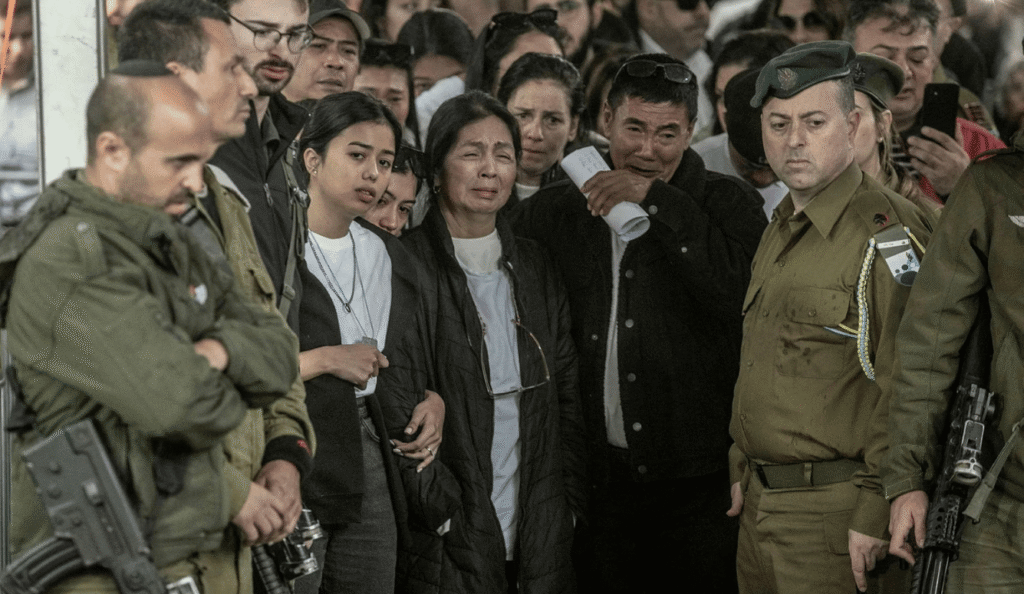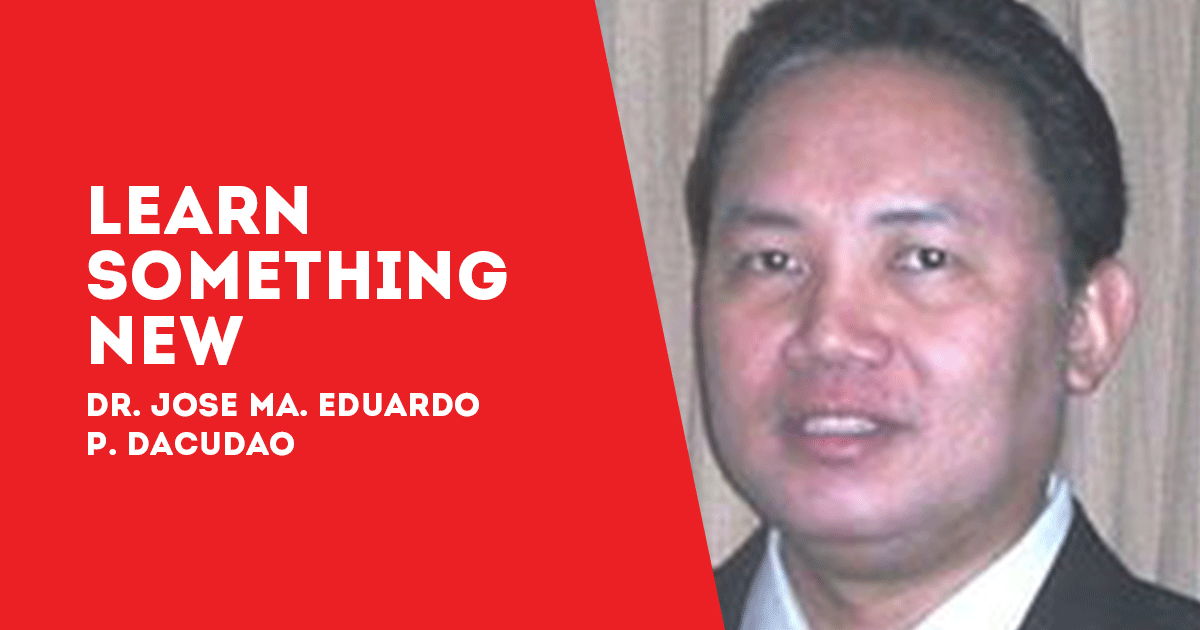A review of Cedrick by Gish Amit, Altneuland Press (May 2025).
“Cedrick is dead,” writes Gish Amit in the opening line of his memoir about Cedrick Green, the Israeli-born son of Filipino guest workers, who died as an IDF infantryman in the Maghazi “refugee camp” (a small slum town) in the Gaza Strip a few months after Hamas terrorists invaded southern Israel, triggering the current war between the Jewish state and its Islamist attackers.
Amit’s slim book, so far published only in Hebrew and German (by the Israeli-run publishing company Altneuland, based in Berlin), reviews Cedrick’s short life against the backdrop of the travails, injustices, and hopes, of southern Tel Aviv’s guest-worker community—mostly Filipinos, Eritreans, Sudanese, and West Africans—and their children, with a few segues into the suffering of Arabs and Israelis in the current multi-front war.
A decade ago, Cedrick was one of Amit’s tenth-grade philosophy pupils at the Bialik-Rogosin School in the poorest part of Tel Aviv. Amit recalls that they discussed ethical questions surrounding issues like vivisection, the bombing of Hiroshima, and how much “collateral damage” is permissible when IDF jets assassinate a Palestinian terrorist leader. In a newspaper interview, Amit claimed that he was fired by the school soon afterwards. He admits that he barely knew Cedrick—he was too busy dealing with the school’s unruly pupils—though he remembers him as polite and gentle and never disruptive.
But on learning of Cedrick’s death, Amit felt the need to tell the young Filipino-Israeli’s story. He begins by describing Cedrick’s funeral. It was special. The mayor of Tel Aviv and the cabinet minister for intelligence matters, Gila Gamliel (“who, just one week previously, had recommended transferring Gaza’s inhabitants to Sinai at the end of the [current] war”), laid wreaths on the freshly dug grave, while Valerie Hamati, a Palestinian-Israeli from Jaffa, sang Leonard Cohen’s “Hallelujah.” At the end, a band played traditional Filipino music.
Much of Amit’s book consists of his conversations with Cedric’s family and friends, including his mother, Imelda, who stated that, “Though he was a Filipino citizen, he devoted his life to his beloved homeland, Israel.” Imelda recalls that “On 7 October, [2023], which was the Sabbath, at 10 am [a few hours after thousands of Hamas rockets rained down on southern Israel], Cedrick arrived to collect his army uniform. I cried. I begged him not to go because I had seen many dead people on the news.”
Cedrick returned home on furlough a number of times over the following weeks. He told his mother that he was stationed on the Israeli side of the border with Gaza. “Only after he died did I understand that he had lied to me so that I wouldn’t go out of my mind with worry,” she explains. At the end of each visit, he would reassure her, “Don’t worry mum, I’ll come and visit you [again].’” But at the end of his final trip home, she reports, he didn’t say those words. Cedrick died a few days later, on 22 January 2024, when a Hamas rocket-propelled grenade (RPG) hit the building he was in and set off a pile of land mines, bringing the building down on Cedrick and twenty of his fellow soldiers. His body was returned to Tel Aviv unscarred, his mother recalls, but his internal organs had collapsed from the shock waves triggered by the RPG, killing him instantly.
Imelda initially came to Israel to work as a carer for an elderly Israeli. Later, she was a cleaner at Ben-Gurion Airport and, later still, cared for a family in northern Tel Aviv. She has lived in Israel for more than two decades and had permanent resident status. The government granted her full citizenship immediately after Cedrick’s death.
Imelda is one of 111,000 legal non-Jewish foreign guest workers in Israel, including some 60,000 caregivers—half of whom are Filipinos. There are another 25,000 illegal foreign workers, many of whom have simply overstayed their visas. Israel almost never grants citizenship to non-Jewish foreign workers, no matter how long they have lived in the country. It is fairly uncommon for them even to be granted permanent resident status—which provides access to subsidised medical services and other benefits. Most of these foreign workers have few rights. Even those who are there legally face deportation the moment their work ends—for example, if the person they are caring for dies—and any illegals who are caught are deported, unless they face probable incarceration or death if returned to their country of origin. Over the years, Israel, like other countries, has often bribed illegals to leave and given certain African states wads of cash to take them in.
Amit notes the “abyss” that divides the Filipinos from the mostly illegal immigrants from Eritrea and Sudan. “Suspicion and enmity” prevail between the two communities who coexist in the Shapira neighbourhood, he writes, since “solidarity of the oppressed does not exist except in the minds of do-gooding progressive liberals and human rights activists, while in reality there is a struggle for position within a hierarchy. In fact, people climb over and tread upon each other in order to get a little more oxygen.” But he also notes that, on occasion, these lowly communities can be generous towards the unfortunate: “Eritreans will fork out money for bail for a jailed neighbour or friend and Filipino families will cook meals for students [wherever they are from].”
The IDF initially refused to induct Cedrick because he had a juvenile criminal record. In his mid-teens, while still at high school, Cedrick spent his evenings working as a courier for drug peddlers. Amit suspected something was amiss because he noticed that Cedrick often fell asleep in class. “N,” one of Cedrick’s high school buddies who also worked for the drug peddlers, tells Amit that they would sell small bags of cocaine for ₪150 (about US$40) a shot and bags of meth for ₪50. Later, when the two decided to go independent, their bosses cornered Cedrick and beat him up. Cedrick and “N” then quit the trade. Cedrick got into various scrapes with the police along the way.
But Cedrick was determined to join the IDF, perhaps because he knew that this was the passport to acceptance in Israeli society—and, perhaps, to his personal salvation. At first, he was only allowed to join the Border Police, a paramilitary service that operates in the occupied West Bank. But Cedrick wanted real army service. For that, he needed his mother’s signature. He begged her to agree. Imelda recalls that when she and Cedrick visited the notary’s office to sign the document allowing him, an only child, to volunteer for a combat unit, he said: “Mom, one day you will be proud of me.” Cedrick spent his IDF conscript years in the Golani Brigade, a crack infantry unit, and as a reservist, he served in other infantry units. He died as a platoon sergeant in Battalion 8208, the 261st Brigade.
All those interviewed by Amit recall Cedrick’s politeness and gentleness and his big heart. These qualities were already evident from the age of nine, when Cedrick adopted a street dog. (After his death, the dog howled for days.) During his time as a reservist, Cedrick often ceded his place in the furlough rotation to soldiers with children. “I can’t take away their weekends,” he explained to his mother. Amit writes that Cedrick was “esteemed” by his fellow soldiers, one of whom recalls Cedrick telling him, “Always be generous, always love and smile.”
Amit also interviewed Yaniv, a Paris-born Israeli who trained Cedrick in Thai boxing. Boxing has always been popular among new immigrants, whom it provides with “a sense of belonging and respect, and sometimes even glory.” As one of Cedrick’s boxing clubmates commented in the Haaretz interview cited above:
Cedrick would tell me about Israel. I had arrived here only a year earlier … [Though] rejected by his country, he was filled with patriotic love … I am haunted by a simple fact: I am a French Jew who arrived in Israel aged 27, and yet, I was granted my citizenship before Cedrick, who fell in love with the country, its values and its people long before I did. It isn’t fair. It’s time we opened our arms to those who love us and live with us here.
Amit also documents his conversations with Cedrick’s widow, Daniela. She and Cedrick became a couple when they were fifteen and married immediately after Cedrick completed his conscript service. She was a Catholic and he belonged to the Kingdom of Jesus Christ (KOJC), a Filipino Restorationist church. So they flew to Limassol, Cyprus to be married in a civil ceremony. Daniela recalls that Cedrick was religious as a young man, but gradually lost his faith, although he continued to pray with his mother and always carried a prayer book.
Immigration and Inequality
For people without a foothold in the new service and financial businesses, it was harder to make ends meet.

It is possible that Cedrick’s disaffection with the Kingdom of Jesus Christ church stemmed from the well-publicised accusations levelled against the church’s founder and leader, Apollo Quiboloy, who has been indicted by the US for sex-trafficking, fraud, money-laundering, and other offences, and is currently awaiting trial in the Philippines. Quiboloy was also an ally of former president Rodrigo Duterte, who is in prison pending a trial for human rights abuses at the International Criminal Court in The Hague. According to Daniela, the church community in Israel ostracised Cedrick—which may have been one of the reasons he turned to crime during high school. Since his death, the church community has also ostracised her.
Amit attended Cedrick’s official memorial service, which was held in Tel Aviv’s Givat Shaul military cemetery, where “a thick-bearded” religious official read the 23rd Psalm (“Yea, though I walk through the valley of the shadow of Death”). They covered Cedrick’s grave with a folded Golani Brigade flag and brown Golani Brigade berets. In accordance with Jewish custom, mourners placed small stones on the grave. They bore the words “we love you Cedrick.” Cedrick’s father, Enrico Basilio, also pronounced the words, “God bless us and God bless Israel.”
Yet Enrico’s own experiences with the State of Israel were mixed—at best. Initially, he was a legal guest worker but then, after seven years as a caregiver, he stayed on after his visa expired. One day, when Cedrick was only fifteen months old, Enrico brought his son to his kindergarten only to find two immigration policemen waiting at the entrance. They tried to handcuff him, but he resisted. Finally, they relented and allowed Enrico to accompany Cedrick inside before they took him away. After a fortnight in Ramle prison, Enrico was deported. He was not allowed to visit Israel and was unable to see his son again until after his death.
Then, 22 years later, he was flown in from the Philippines for his son’s funeral, at the invitation of the Israeli government. Afterwards, while still in Israel, he applied for citizenship, but it took the vacillating state bureaucracies a full ten months to even issue him with permanent residency status. Meanwhile, Enrico was left in limbo—neither able to work in Israel nor to leave the country to visit his new family back in the Philippines. The state refused to recognise Enrico’s paternity unless he allowed them to disinter his son to perform a DNA test. Enrico refused: “I prefer to waive the citizenship and not disturb him. Even if I have to leave Israel never to come back.” As Amit notes, Enrico’s experiences suggest that the Israeli state preferred the letter of the law “to his son’s welfare.”
On the other hand, Amit notes, in 2005, the government decided to give the Israeli-born children of guest workers first permanent resident status and, eventually, full citizenship. Cedrick was granted citizenship a few years before he was inducted into the IDF. But Amit writes that, for people like Cedrick, at the bottom of society’s food chain, the IDF was a lifeline, “but not a lifeline given with generosity, but one he had to grab hold of and pull himself up with.” However, it seems clear that for Cedrick, his IDF service was a source of infinite pride.
On 7 October 2023, Hamas gunmen murdered sixty-two foreign guest workers (alongside around 1,100 Israelis). They hailed from Thailand, Sri Lanka, Nepal, Moldova, Cambodia, Sudan, and Eritrea. There were also four Filipinos, all of whom had been working as caregivers in the kibbutzim ravaged that day. In one of the book’s many segues, Amit describes the life and death of one of those caregivers: Paul Vincent Castalby. Paul sent most of his earnings back to his relatives in the Philippines. He was married to another Filipino guest worker, Bel, who lived in Or Haner, a kibbutz 25 kilometres from Kibbutz Be’eri, where Paul lived. The days immediately following 7 October were chaotic. But eventually, Bel was informed that Paul’s charred body had been identified outside the home of Terry and Lilach Kipnis, the couple he had worked for. Terry Kipnis, a skipper, was a peacenik who had once donated a bed to a Gaza hospital. Terry and Lilach’s charred bodies were found inside the house. Three weeks later, Bel gave birth to Paul’s child. Amit ponders the relationship between Paul and the elderly couple. On the one hand, they were very close—like “father and son,” some of the kibbutzniks said—but on the other hand, as a Filipino carer, Paul could not enjoy a proper family life with his own pregnant wife, as he could not leave his work in Be’eri without losing his right to remain in Israel.
In another of Amit’s segues, he takes a brief look at the Gaza Strip’s Al-Maghazi refugee camp, where Cedrick died. It served as a British Army camp in World War II after which American Quaker do-gooders converted it into a refugee camp. During the 1948 War, it accommodated refugees from the Arab villages of Yazur, Qastina, Betani, and Mughar—all of which were evacuated, levelled, and then rebuilt as Jewish settlements, which are now part of Israel. In 1967, Maghazi housed some 8,300 refugees; by 2023, at the start of the current war, some 33,255 Palestinians were living within its 0.6 square kilometres, according to Amit. On 24 December 2023, ten weeks after the start of the war, Israeli aircraft targeted three buildings in Maghazi, killing at least seventy Palestinians and wounding dozens. Following the bombing, tens of bodies were laid out in the camp’s main square wrapped in transparent nylon sheets, while children wandered through the ruins in shock as women wailed in mourning.
How many inhabitants were left in the camp when Cedrick’s unit entered Maghazi after the bombing is unclear. In Cedrick, Amit includes the full text of the poem, “The War has Ended” by Maghazi resident Nasser Rabah, who lost relatives in the war and whose poems, originally written in Arabic, has periodically appeared in Israeli literary journals in Hebrew translation. Amit also quotes another poem by Rabah:
When I return from the war
If I return—Don’t look into my eyes,
Don’t see what I have seen.
Amit also describes meeting a group of Cedrick’s Rogosin schoolmates. One of them, Michael, works for an association that helps the children of guest workers. She teaches Eritrean children IT. She comments:
It is a shame that Israel doesn’t allow people like us [non-Jewish foreigners] to live here, not only because we are completely Israeli and because our families and friends are all here, but because we are coming from pain, we know a lot about pain. … and who except people like us, who know pain from close up, can help these suffering children.
Michael shows Amit part of an autobiographical novel she is writing about her terrible journey from Eritrea to Israel—crossing a crocodile-infested river on logs, walking across Sudanese deserts to reach Egypt’s Sinai Peninsula, where she joined a convoy of refugees who had paid people smugglers thousands of dollars to help them reach the Israeli border. Their guides beat them with sticks, they and the local Bedouin raped them, and Egyptian troops shot at them. When the migrants finally managed to cross the fence into Israel, she writes, IDF soldiers welcomed them “with love” as well as water, chocolate, and warm clothes, before taking them to a detention centre where they spent several weeks after which they were bused to southern Tel Aviv.
Towards the end of the book, Amit writes:
A few days ago, while teaching a fifth-grade class [composed of children of foreign workers, Arabs, and poor Israeli Jews], I asked the children about their dreams, what they would like to do when they grow up. They were mum, no one said anything, they looked at me for a long time … without saying a word. I was saddened that they have no dreams.
Cedrick tells two stories. The first is about a Filipino-Israeli soldier who dies fighting Islamist terrorists in Gaza’s Al-Maghazi “refugee camp” soon after becoming an Israeli citizen. The second is about the travails of Israel’s underclass of foreign guest workers, especially the short-term, mostly female Filipino caregivers who abound in the country’s middle-class neighbourhoods and kibbutzim.
Taken together, the two bisecting stories offer up a tale of personal salvation underwritten by an individual tragedy, together with a broader portrait of the collective hardships and injustices faced by Israel’s guest worker community. The young soldier Cedrick Green achieves his short life’s supreme ambition and becomes a real “Israeli”—but dies in the process. Yet, immediately after his death, his grief-stricken Filipino mother is granted Israeli citizenship. In Amit’s telling, Cedrick’s individual story sheds light on the plight of the tens of thousands of foreign workers, both legal and illegal, marooned in an increasingly exclusivist Jewish state, finding only low-paying jobs or no job at all, harassed by immigration police and insensitive bureaucrats. They have no salvation of any sort in prospect. And they are rarely mentioned in the current depictions of Israeli society in Western media.











